- Home
- Deborah Harkness
Time's Convert Page 49
Time's Convert Read online
Page 49
They crossed the entrance hall and into the parlor, where another fireplace shared the same wall with the one in the kitchen. This room was grander, with rough plastered walls that had been whitewashed. Bits of plaster had fallen off here and there, and the dust was visible in the air thanks to the slanting rays of the afternoon sun. A long table sat in the center of the room, its dark wooden surface cracked and split. Pulled up to it was a small chair with holes in the back slat.
Marcus touched the hooks over the fireplace.
“This is where we kept my grandfather’s gun,” Marcus said. He rested his hands on the mantel. “My mother’s clock sat here. She was probably buried with it, or else she left it to Patience.”
Phoebe slid her arms around Marcus’s waist from behind and rested her forehead against his back. She could feel her mate’s pain, but she could also hear the bittersweet note in his voice as Marcus remembered and remembered some more. She pressed a kiss against his spine.
Marcus placed an old book on the mantel, slender and bound in brown leather. His fingers caressed the covers for a moment. He turned to face her, and was distracted by something in the nearby corner.
“Philippe’s chair,” he said in a tone of disbelief.
Phoebe recognized the old, blue-painted chair with the curved, frondlike volutes at the ends of the crest rail, the gracefully tapered legs, and the substantial saddle seat. It was always in the same spot in Philippe’s study at Sept-Tours, and Phoebe had never seen anyone sit in it, in spite of its sturdy construction. The paint on the arms was worn through to the bare wood, a sign that it had once been in constant use.
An envelope addressed to Marcus was propped against the finely turned spindles.
Marcus frowned and reached for the letter. He slit the top with his finger and pulled out the single page.
“Philippe would want you to have his chair,” Marcus read aloud. “So would Dr. Franklin. Remember we are not far away, if you have need of us. Your father, Matthew.”
Diana had made sure Phoebe knew exactly how to get to their house in New Haven, which parts of the route were likely to be difficult in snowy weather, and every phone number where she and Matthew could be reached—just in case.
“I’m not sure I have the nerve to sit in it.” Marcus sounded slightly awed by his new possession.
“If you don’t, I will,” Phoebe said with a laugh. “Ysabeau told me Philippe thought it was the most comfortable chair in the world.”
Marcus smiled and ran one finger along the arm rest. “I must say it suits this house better than it ever did Sept-Tours.”
Phoebe thought it suited Marcus, too.
Back in the front hall, Marcus stared at the newel post at the bottom of the stairs, where faded black ink delineated a jagged coastline. They climbed the stairs, which were narrow and swayed slightly under their weight. The two rooms upstairs were unfinished, with simple boards laid across beams to make the floor, and neither plaster nor wooden paneling to hide the walls’ construction. Between the clapboards you could see a few glints of sunlight.
“Which room was yours?” Phoebe asked.
“This one,” Marcus said, pointing to the room over the kitchen. “Ma insisted we sleep here, because it was warmer.”
The room was empty, except for an old brass rooster that looked as though it belonged to a weather vane.
“It’s much smaller than I remember,” Marcus said, standing next to the window.
“Do we need more than this?” Phoebe was already imagining the house with fresh paint on the inside, the panes of glass clean and gleaming, a fire crackling in the kitchen hearth and filling the house with homely sounds and scents.
“Neither of these rooms have doors.” Marcus’s eyes darted around the room. “I’m not sure we could even get a bed up here.”
“What does that matter?” Phoebe laughed. “We don’t sleep, remember?”
“That’s not the only thing beds are good for,” Marcus said, his voice lower and more intense than usual. He pulled Phoebe into a kiss that was deeply possessive. Had she still been a warmblood, it would have left her breathless.
But there was no rush for them to make love. They had hours and hours left in the day, and no need to look for food or shelter or warmth or light. They had each other, and that was enough.
“Let’s go look at the barn,” Phoebe said, drawing away and leading him back toward the stairs.
They stepped outside the kitchen door that led out back—it would need to be planed at the bottom to make it easier to open and close, Phoebe noted. And it was a good thing they were vampires, and impervious to cold, because the wood wasn’t thick enough to keep out the chill for much longer. How had Marcus’s family survived a Massachusetts winter with only that thin door between them and the snow and the wind?
Marcus stopped in his tracks.
Phoebe looked back at him. She recognized this spot. It was etched in Marcus’s blood, just like the coastline of America was on the newel post on the stairs.
“You made the only choice you could,” Phoebe said, returning to his side. “It had to be done.”
“Hey!” A woman waved from the road. Her hair was iron gray and she was wearing an apricot-colored shirt and white cropped trousers as though she were about to go on holiday in the Caribbean. “You two are trespassing. Get out of here, or I’ll call the cops.”
“I’m Marcus MacNeil. I own this place.” His true name flowed smoothly off his tongue. Phoebe blinked, used to thinking of him as Marcus Whitmore.
“Well, it’s about time you showed up. Every year people come and clear the snow, and mow the hay, and make sure the roof hasn’t collapsed, but a house doesn’t like to be empty.” The woman peered at them through wire-rimmed spectacles. “I’m your neighbor. Mrs. Judd. Who’s she?”
“I’m Marcus’s fiancée.” Phoebe tucked her hand into Marcus’s elbow.
“Are you two planning on living here now?” Mrs. Judd looked them both over. “It would be awfully hard work to make this house habitable. It’s not connected to the sewer, or the power grid, for starters. Of course, nothing worth doing is ever easy.”
“You’re right,” Marcus said.
“There are lots of stories about this place, you know. Somebody found a human skull under that tree.” Mrs. Judd pointed to the large elm tree. “They say the split in the door was made in one of the last Indian raids. And the cellar is definitely haunted.”
“How enchanting,” Phoebe said brightly, wishing this busybody would leave off the spooky stories until they got to know her better.
“You sound foreign,” Mrs. Judd said suspiciously.
“English,” Phoebe replied.
“I knew you were different.” On this rather ambiguous note, Mrs. Judd decided that they had visited long enough. “I’m going to spend Labor Day at the Cape with my kids. If you are going to stay here, can you bring in my mail? Oh—and if you could feed my cat, I’d appreciate it. Just leave food out on the back porch. She’ll find it if she’s hungry.”
Without waiting for a reply, Mrs. Judd trod off in the direction of home.
Marcus wrapped his arms around Phoebe and held her close. His heart was beating a bit fast, which put their bloodsongs out of sync. “I’m not sure if this is a good idea.”
“I am.” Phoebe sighed happily. “I choose you, Marcus MacNeil. I choose this place. I choose to wake up here tomorrow, next to you, surrounded by memories and ghosts, with no electricity and a falling-down barn.”
Phoebe held Marcus until his blood stopped racing and their hearts were beating to the same rhythm.
Evermore.
“I’m sure you never dreamed we’d end up here,” Marcus said. “It’s not exactly a beach in India.”
“No,” Phoebe confessed, thinking of Pickering Place with its elegant furniture, and the grandeur of Sept-Tours. The
n she looked back at the MacNeil house. She thought of all that had been lost within its walls, and all the joys that might be found there.
“I didn’t realize how much this place still mattered to me,” Marcus said.
They stood, hands entwined, and looked over the farm where Marcus had lived so many years ago, and which was now his. Hers. Theirs.
“Welcome home,” Phoebe said.
Evermore, sang their two hearts.
Evermore.
ACKNOWLEDGMENTS
I don’t know where to start, and so I find myself taking Hamish Osborne’s advice: begin at the end.
To Laura Tisdel and the entire team at Viking: thank you for the many kindnesses shown to the author and the depth of expertise you all brought to this project in every department and at every stage of its production.
To my stalwart supporters, Sam Stoloff of the Frances Goldin Literary Agency and Rich Green of ICM Partners: I could not do this without the two of you.
To my publicist, Siobhan Olson of Feisty PR: thank you for taking on All Souls and reminding me to have fun.
To my operations manager, right arm, and co-conspirator, Jill Hough: I am so grateful for you every day and for all the many ways you make this possible.
To my gentle readers Candy, Fran, Karen, Karin, Lisa, and Jill: thank you for always saying yes when I asked if I could trouble you with another draft.
To my historical experts Karen Halttunen, Lynn Hunt, Margaret Jacob, and Karin Wulf: thank you for being so patient with an early modernist who drifted into the long eighteenth century. I pestered you with questions, peppered you with my reactions to the period, and in general made a nuisance of myself. You responded with generosity and lent your considerable expertise to this book when called upon to do so. You will all know better than anyone that the remaining mistakes are my own!
To the family and friends (two-legged and four-legged) who pick me up, dust me off, and carry me along—you know who you are: thank you for being part of my circus. My mom, Olive, can share in this experience and is a source of joy as well as inspiration. Thanks, Mom, for always being my biggest cheerleader.
To my Karen, no words could ever express how much your support and love make this all possible.
First, and last, this book is dedicated to the memory of my beloved father, John Campbell Harkness (1936–2015), whose roots extended down into the soil of Pelham and Hadley, who lived much of his life in Philadelphia, and who shared his love of history with me.
ABOUT THE AUTHOR
Deborah Harkness is the number one New York Times bestselling author of A Discovery of Witches, Shadow of Night, and The Book of Life. A history professor at the University of Southern California, Harkness has received Fulbright, Guggenheim, and National Humanities Center fellowships.
What’s next on
your reading list?
Discover your next
great read!
* * *
Get personalized book picks and up-to-date news about this author.
Sign up now.

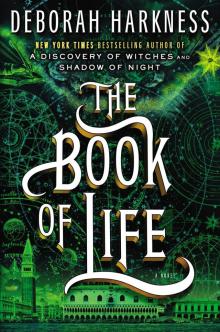 The Book of Life
The Book of Life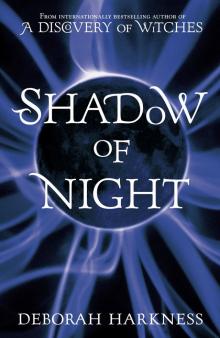 Shadow of Night
Shadow of Night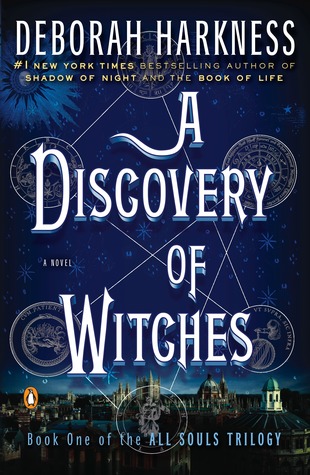 A Discovery of Witches
A Discovery of Witches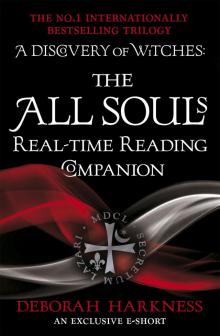 The All Souls Real-Time Reading Companion
The All Souls Real-Time Reading Companion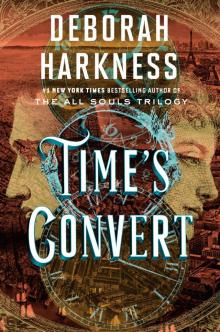 Time's Convert
Time's Convert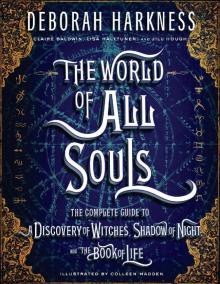 The World of All Souls
The World of All Souls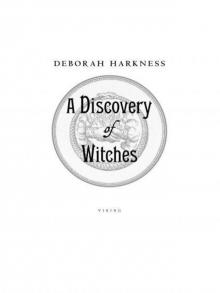 A Discovery of Witches: A Novel (All Souls Trilogy)
A Discovery of Witches: A Novel (All Souls Trilogy)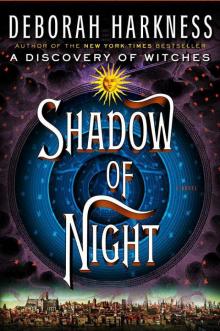 Shadow of Night: A Novel
Shadow of Night: A Novel